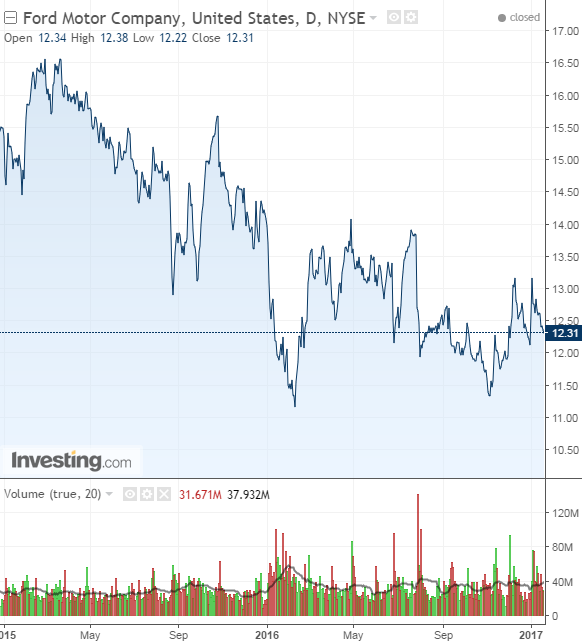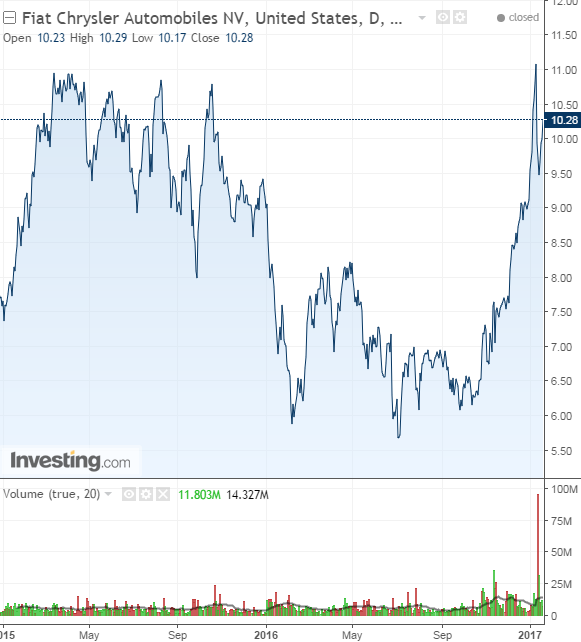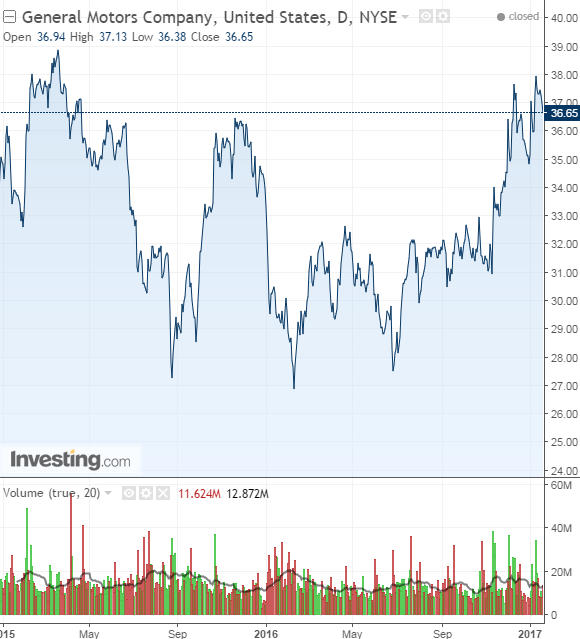by Clement Thibault
The US auto sector, once the crown jewel of American manufacturing, has been at the forefront of newly inaugurated President Trump's protectionist platform since early in his campaign. Some believe that after years of manufacturing jobs leaving Detroit for cheaper, off-shore destinations, Trump's promises to bring back automobile production jobs to the US were the catalyst for his victory in Michigan, a state that voted Democrat by a 9.5% margin in 2012.
The automobile industry is also one of President Trump's favorite tweet targets. Since the beginning of 2017, the newly inaugurated chief executive has directed threatening tweets at Ford and General Motors. On January 3, the then President-elect promised to initiate a 'big border tax' should the automakers continue to export jobs to Mexico. Shortly thereafter Ford cancelled its planned, $1.6 billion dollar plant in San Luis Potosi, Mexico, and General Motors announced plans to invest at least $1 billion dollars in its US manufacturing business, potentially creating 2,000 new stateside jobs.
Amid all the political brouhaha, how promising are Ford (NYSE:F), General Motors (NYSE:GM), and Fiat Chrysler (NYSE:FCAU) shares?

Ford and Fiat Chrysler both report earnings on Thursday, January 26, before the market opens.

GM reports early next month, on Tuesday, February 7, before the open.

Ford is expected to report EPS of $0.32 on $34.89 billion in revenue, Fiat Chrysler is expected to report EPS of $0.53 on $34.09 billion in revenue and GM is expected to report EPS of $1.12 on $42.71 billion in revenue. Here's what to look for:
1. Sales
Ford sold a tad over 2.6 million vehicles in the US during 2016, its best annual sales number in a decade. Its F-series truck remains the leader in its field, with 820K vehicles sold, or about a third of Ford's entire business for the year. Growth for the F-Series in 2016 is estimated at 5.2%. Overall, for the year, Ford has seen growth of 0.1%, mainly because sales in its 'cars' segment, which includes such models as the Focus and Fiesta, fell a massive 13%.
General Motors also enjoyed a good 2016, with retail sales up nearly 2%. Chevrolet in particular has been a great performer for GM, with growth of 3% and market share growth of 0.5 points, according to GM's estimates.
Fiat Chrysler is not doing nearly as well, with declining sales of four of its six brands which include Chrysler, Alfa Romeo and Dodge, and flat growth across the board. Jeep and Ram were the two bright spots for Fiat Chrysler this past year, growing at a 11% and 6% pace on the year, respectively.
2. Revenue and Income
GM leads the three in revenue and net income, bringing in $162 billion of revenue, and $13.6 billion in net income TTM. Ford, with $153.4 billion revenue and $7.24 of net income, comes in second. At the back of the pack, Fiat Chrysler comes in at $122.9 billion in revenue and only $1.81 billion net income.
Revenue growth TTM shows GM is once again in the lead, with 6.3% growth over the course of the last year. Ford lags slightly at 5.6% growth on the year, while Fiat Chrysler's revenue grew a dismal 1.4%.
3. Profitability
GM is also leading in several metrics. With an operating margin of 6% GM is far ahead of Ford's 4.2%, and both are light years ahead of Fiat Chrysler's smaller 0.7%.
Return-on-Equity is one of the most important metrics used to compare the efficiency and profitability of a company. GM leads with a 34% ROE, followed by Ford's 24%, and Fiat Chrysler's 10%.
To compliment the ROE analysis, a quick look at debt tells us that GM is indeed meeting some capital needs via debt financing: the non-current portion of their long term debt grew by 32%, to $53 billion. Ford's long term debt hasn't grown recently, but it is much more substantial at $90 billion. Fiat Chrysler is actually the company with the least amount of non-current debt, $22 billion, down from $35 billion a year ago.
Inventories is another important metric as far as car makers are concerned. Growing inventories may suggest trouble selling product. Fortunately, each of the three companies is able to keep its inventories under control and there is nothing worrying for any of the three in this regard.
4. Dividends
Both GM and Ford offer a pretty solid dividend yield. Ford leads with a yield of 4.83%; GM pays out a 4.04% dividend. While interest rates may be on the rise, both dividends are currently significantly higher that the US 30-year bond yield, now approximately 3%.
Both company's payout ratios are acceptable as well, with Ford's at 46% and GM's at 17%. GM restarted their dividend payouts in 2014, almost six years after the car maker declared bankruptcy in 2009. Ford's dividend policy has been in place since 2012 and during the past two years the company has paid a supplemental dividend on top of its regular dividend.
Fiat Chrysler pays no dividend.
5. Future Outlook
Ford's 2017 guidance anticipates lower profits than in 2016, signaling there may be another year of sub-par returns from the car maker. This is not to say that the company's outlook isn't good longer term, but when the company itself warns of expected weakness in the coming year, investors would be smart to pay attention.
GM on the other end, announced guidance of $6-6.50 dollars per share of profit, which at least equals the expected $6.01 EPS that the company is anticipated to report for the entire 2016. GM also plans to roll out the Chevy Bolt this year, its affordable electric car, and at present the main competitor to Tesla's (NASDAQ:TSLA) Model 3. The two models are the only mass produced electric cars currently available and would be the first ones to reach the market during 2017.
While some argue that the Model 3 has nicer lines, the Chevy Bolt is expected to have better range per charge at 238 miles vs the Model 3's 215. More importantly, the Chevy Bolt will roll out nationally during 2017, which means it will be available across the entire country by September, while the earliest Model 3 deliveries are expected no sooner than early 2018.
Fiat Chrysler's Jeep and Ram sales are expected to continue growing, while other brands such as Alfa Romeo, Masarati and Lancia are expected to continue to weigh on the company's performance.
Of course, the biggest wildcards for the American auto industry right now are the future and viability of US manufacturing and President Trump's proposed policies on imports. Manufacturing in the US is expensive, which is why automakers (and other companies) years ago outsourced certain jobs to Mexico or China. All the outsourcing was initiated to benefit the corporate bottom line.
But what will happen if companies are forced to bring back manufacturing to the US, or have to pay that 'big border tax'? What impact will it have on the industry's profitability? Will prices go up? And how will a possible price increase affect demand for new cars?
At this juncture the questions are endless and answers are few. This uncertainty alone is enough to keep automakers' share prices depressed and cheap.
Conclusion
All the US car makers are relatively cheap right now. Ford closed yesterday at $12.61 a share and sells for seven times its yearly earnings; GM closed at $37.00, and has a P/E ratio of 4.3, while Fiat Chrysler, at $10.88 a share at yesterday's close, sells for 8.5 times earnings. Comparing Price-to-Book values provides a similar picture: Ford is selling for 1.5 times its book value, GM 1.28, and finally Fiat Chrysler, at 0.87 times its book value.
In our opinion, and in light of the above data, of the three, GM is the better buy. Its renewed growth and future outlook appear to be the brightest, particularly ahead of the still-unheralded Chevy Bolt release scheduled for later this year. It's a car that could potentially become a catalyst for GM share price growth, something that Ford sorely lacks.
